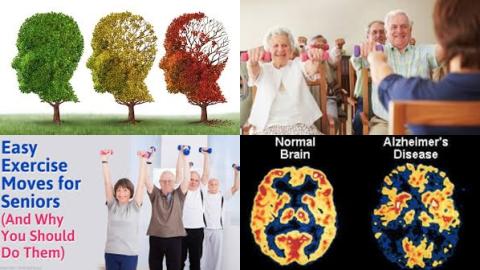
Objectives:
Does exercise training delay the decline in cognitive function among individuals who are at risk of/or have Alzheimer's disease?
Study design:
This review article included 19 controlled studies with 23 interventions including 1,145 subjects with a mean age of 77.0 ± 7.5.
The studies included an exercise-only intervention and a nondiet, nonexercise control group and reported pre- and post-intervention cognitive function measurements.
Most subjects were at risk of Alzheimer's disease because they had mild cognitive impairment (64%) or a parent diagnosed with Alzheimer's disease (1%) and 35% presented with Alzheimer's disease.
Exercise interventions were performed 3.4 ± 1.4 days per week at moderate intensity (3.7 ± 0.6 metabolic equivalents) for 45.2 ± 17.0 minutes per session for 18.6 ± 10.0 weeks and consisted primarily of aerobic exercise (65%).
Results and conclusions:
The investigators found overall, there was a modest favourable effect of exercise on cognitive function [d+ = 0.47, 95% CI = 0.26 to 0.68].
The investigators found within-group analyses revealed that exercise improved cognitive function [d+w = 0.20, 95% CI = 0.11 to 0.28], whereas cognitive function declined in the control group [d+w = -0.18, 95% CI = -0.36 to 0.00].
The investigators found within-group analyses revealed that aerobic exercise had a moderate favourable effect on cognitive function [d+w = 0.65, 95% CI = 0.35 to 0.95), but other exercise types did not [d+w = 0.19, 95% CI = -0.06 to 0.43].
The investigators concluded that exercise training (3.4 days per week at moderate intensity for 45.2 minutes per session during 18.6 weeks) delays the decline in cognitive function that occurs in individuals who are at risk of/or have Alzheimer's disease, with aerobic exercise having the most favourable effect. Additional randomized controlled clinical trials that include objective measurements of cognitive function are needed to confirm these findings.
Original title:
Can Exercise Improve Cognitive Symptoms of Alzheimer's Disease? A Meta-Analysis by Panza GA, Taylor BA, […], Pescatello LS.
Link:
https://www.ncbi.nlm.nih.gov/pubmed/29363108
Additional information of El Mondo:
Find here more information/studies about elderly and sport nutrition.
Metabolic Equivalents (METs) are commonly used to express the intensity of physical activities.
MET is the ratio of a person's working metabolic rate relative to their resting metabolic rate.
One MET is defined as the energy cost of sitting quietly and is equivalent to a caloric consumption of 1 kcal/kg/hour.
|
PHYSICAL ACTIVITY |
METs (Metabolic Equivalents) |
|
Light intensity activities |
3 |
|
Sleeping |
0.9 |
|
Watching television |
1.0 |
|
Writing, desk work, typing |
1.5 |
|
Walking, 1.7 mph (2.7 km/h), level ground, strolling, very slow |
2.3 |
|
Walking, 2.5 mph (4 km/h) |
2.9 |
|
Moderate intensity activities |
3 to 6 |
|
Bicycling, stationary, 50 watts, very light effort |
3.0 |
|
Walking 3.0 mph (4.8 km/h) |
3.3 |
|
Calisthenics, home exercise, light or moderate effort, general |
3.5 |
|
Walking 3.4 mph (5.5 km/h) |
3.6 |
|
Bicycling, 10 mph (16 km/h), leisure, to work or for pleasure |
4.0 |
|
Bicycling, stationary, 100 watts, light effort |
5.5 |
|
Vigorous intensity activities |
> 6 |
|
Jogging, general |
7.0 |
|
Calisthenics (e.g. pushups, situps, pullups, jumping jacks), heavy, vigorous effort |
8.0 |
|
Running jogging, in place |
8.0 |
|
Rope jumping |
10.0 |
|
Physical activities |
METs |
Amounts of kcal used |
|
Softball / baseball |
5 |
150-188 |
|
Hiking, light pack |
6 |
180-225 |
|
Skiing, moderate effort |
6 |
180-225 |
|
Horseback riding, trotting |
6.6 |
195-244 |
|
Tennis, singles |
7 |
210-263 |
|
Raquetball, casual |
7 |
210-263 |
|
Volleyball, competitive |
8 |
240-300 |
|
Touch or flag football |
8 |
240-300 |
|
Mountain biking |
8.5 |
255-323 |
|
Rock climbing |
11.0 |
330-413 |